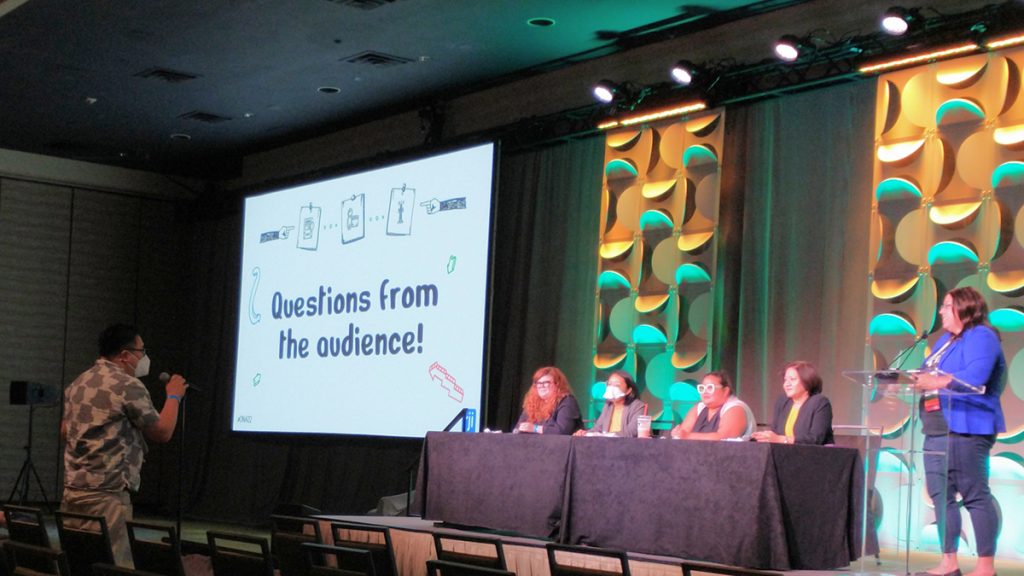
An attendee (L) asks questions of former RJI fellows (L-R) Hannah Wise, Sisi Wei, Emma Carew Grovum and Yukari Kane at a panel moderated by RJI Director of Innovation Kat Duncan (R).
RJI’s second day at ONA22 delivers deep discussion of creating and maintaining accessible and inclusive news coverage
LOS ANGELES (Sept. 22, 2022) — On the second day of ONA22 in Los Angeles, four RJI fellows took the stage to introduce their projects to the audience and take questions about promoting inclusivity, equity and accessibility — both in news coverage and in newsrooms themselves.
RJI Director of Innovation Kat Duncan moderated the discussion, which ranged from tips about how to encourage fruitful internal conversations about accessibility and diversity at news organizations to solutions for increased transparency with employees and sources.
Emma Carew Grovum, whose fellowship project involved creating a guide for promoting and retaining journalists of color, discussed the importance of an open dialogue between reporters and newsroom managers — especially when it comes to assigning stories to reporters based on factors like race and community affiliation.
“People are not a monolith,” Carew Grovum said. “Some are quite honored to cover their own communities. Others have a lot of trauma from being told they can’t cover their communities. It’s important to ask people, are you comfortable covering this story?”
Yukari Kane added an appeal to make sure that stories are assigned for the right reasons and based on an open dialogue with the reporter.
“Please make sure it’s more than just tokenism, that the story is being incorporated into coverage in a significant way,” said Kane, founder and co-excutive director of the Prison Journalism Project, who developed a framework for collaborating with incarcerated people on coverage of American prisons and life in the system.
“When we talk about equity and inclusion, we sometimes create the impression that it involves climbing a giant mountain one step at a time for the rest of mankind’s future. Getting away from that metaphor will help you really connect to people and encourage them to keep doing this work.”
Kane also pointed to an additional method of ensuring that reporting accurately reflects the communities it covers.
“The AP has peer monitors of news coverage, which I think is a great idea,” she said. “People in senior DEI positions can be difficult to replace when they leave, and having someone who isn’t senior keeping an eye on coverage is a great way to get useful feedback.”
That discussion of turnover in DEI positions also brought to mind the ebb and flow of motivation when it comes to maintaining a focus on representation and equitable reporting. For Sisi Wei, founder of the DEI Coalition for Anti-Racist, Equitable, and Just Newsrooms, a key part of keeping motivation high is ensuring that communication with reporters is supportive, not intimidating.
“When we talk about equity and inclusion, we sometimes create the impression that it involves climbing a giant mountain one step at a time for the rest of mankind’s future,” Wei said. “Getting away from that metaphor will help you really connect to people and encourage them to keep doing this work.”
Wei’s fellowship was spent creating a guide to turning private conversations into public resources, a process that depends on transparency with sources at every step to build a sense of community and trust.
“There is a lot to be said for sharing more or all of a piece with people before publishing,” she added. “What are we scared of? Getting feedback?”
Hannah Wise, the central region audience editor for McClatchy, noted that such transparency should also apply to internal conversations at newsrooms themselves. During Wise’s fellowship, she created a toolkit guiding newsrooms through the process of evaluating the accessibility of their products to the disability community, as well as evaluating their coverage of that community. Wise reflected that perspective in her comments on transparency.
“In a past position, I was able to take part in monthly town halls that celebrated staff but also gave people a point of access to ask tough questions,” Wise said. “That gave higher-ups a chance to answer questions honestly, to be real with everyone. Transparency is always the best policy.”
Click here to learn more about RJI Fellowships and the work of current and past fellows.

Comments